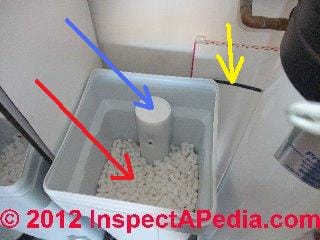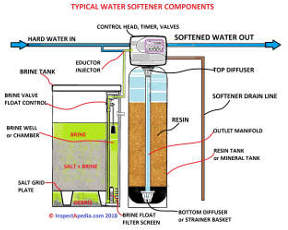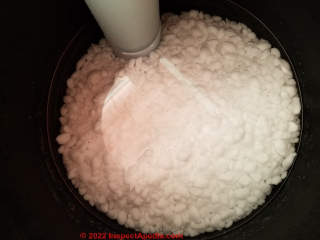 Water Softener Salt Choices
Water Softener Salt Choices
What kind of salt should I buy for my water softener
- POST a QUESTION or COMMENT about how choose & buy water softener salt or salt substitutes
Water softener salt options: which salt should you buy?
Page top photos: salt pellets in an Arizona water softener.
This article series describes procedures for diagnosing and repairing water softener or water conditioner problems including water conditioner control settings and adjustment or repair, brine tank and brine tank float cleaning and repair, and the proper amount of water softening or conditioning that is needed.
InspectAPedia tolerates no conflicts of interest. We have no relationship with advertisers, products, or services discussed at this website.
- Daniel Friedman, Publisher/Editor/Author - See WHO ARE WE?
Water Softener Salt Products, Options for Use in the Brine Tank
 As we explain at how water softeners work, salt is used in the water softener to remove other minerals, typically calcium and magnesium that cause hardness in water.
As we explain at how water softeners work, salt is used in the water softener to remove other minerals, typically calcium and magnesium that cause hardness in water.
The minerals removed by the water softener accumulate inside that device and must be periodically removed by a water conditioner / softener regeneration cycle.
The standard product used in water softener brine tanks is ordinary salt NaCl (Sodium chloride) - the same substance used in table salt.
[Click to enlarge any image]
Salt for water softeners is sold generally in these forms:
- Salt pellets: a prepared salt product that is asserted to have been cleaned of extraneous debris and formed for easy flow in the brine tank
- Salt blocks or bricks: prepared salt sold in larger block or brick forms, also cleaned of debris
- Solar salt: crystals made by evaporating seawater, depending on the country and method of preparation this salt may also be cleaned of debris - or not, and depending on how it was prepared, its crystals may be too fine for use in a water softener.
- Rock salt: raw salt crystals also sold for use in the brine tank of a water softener
Watch out: some "rock salt" products sold for use in water softeners contain quit a bit of soil debris that accumulates in the brine tank, making periodic brine tank cleanout an important maintenance chore. - Potassium chloride (KCl): used in potassium based water softeners instead of salt (NaCl), discussed
at WATER SOFTENER SALT SUBSTIUTE: POTASSIUM CHLORIDE
Or in some softeners Magnesium chloride (MgCl) used in a few MgCl based water softeners.Watch out: however different water softener settings will be required if you're using KCL or MgCl.
How To Choose the Best Salt Product for Your Water Softener
Here in a series of simple steps we explain what you should consider before buying a salt for your water softener
Photo: salt crystals or "rock salt" specifically sold for use in water softeners, installed in a water softener in San Miguel de Allended, Guanajuato, Mexico.
- Salt tablets or pellets vs salt blocks vs natural crystals
Some softeners specifically want pre-formed salt molded into a dispenser shape -spherical or tablets, pellets or blocks.
Clean:
Prepared salt pellets or blocks have been cleaned of dirt and other impurities that may be present in ordinary rock salt (and usually cost a bit more).
Pellet salt offers a second advantage: it tends to avoid salt bridging problems that can jam up salt in the brine tank.
Cost?
Because it has been cleaned and requires preparation to form into pellets, pellet salt may cost a bit more than other crystal-form water softener salt products.
but
Most water softeners will accept coarse granulated salt packaged for water softeners.
So first, check your water softener manual to see if it requires tablets or a special salt form.
Block or brick salt?
Watch out: Some water softener manufacturers such as Rheem who provide water treatment equipment, specifically advise against using block or brick salt, explaining that the salt dissolves too slowly - the softener regeneration cycle will or may be insufficient and the result may be water that is too hard.
Rheem also notes that some softener models actually measure the amount of salt in the brine tank based on a leveled salt load in the tank. In block or brick form that measurement will be erroneous and could result in either running out of salt or erroneous “low salt” alerts from the equipment. - Buy normal salt - NaCl - or Buy Potassium Chloride KCl or Magnesium Chloride MgCl?
Many water softeners can (with an adjustment to the salt dose) work with potassium chloride, an alternative to normal sodium chloride (NaCl) and a few may use Magnesium Chloride (MgCL) and some building occupants prefer that softener salt for reasons of health concerns - specifically needing to avoid ingesting sodium - (though in our OPINION a properly-adjusted water softener ought not be dosing your drinking water with excessive salt levels)
Note that KCl may not be suitable for very hard water conditions.
Note that MgCl may be preferable if your water chemistry is aggressive (corrosive) as it may reduce the corrosive effects of your water on metal water pipes
If you don't have a special need for or a softener specifically designed for KCl - Postassium Chloride - Is other water treatment also needed? E.g
For example, if your water supply is high in Iron content (Fe) and if you don't already have an iron removal system installed, your water softener installer might recommend a ( more-expensive) salt product that also claims to reduce iron, such as Morton Salt Company's "Rust Defense Water Softener Salt" - Use Clean salt: Since chemically all softener salt is the same NaCl, I'd simply buy a brand that's clean of accompanying dirt or debris - so maybe avoid the cheapest or try just one bag to see how much dirt it leaves in the softener.
Evaporated salt and “solar” salt (from evaporated sea-water), depending on their source and details of their preparation, are cleaner - containing less soil and other impurities than mined-salt.
Well-Known Respected Water Softener Salt Brands / Products
- CAI Diamond Crystal water softener salt
- Cargill water softener salt
- Culligan water softener salt
- Diamond Crystal water softner salt tablets
- Kinetico evaporated salt for water softeners
- Morton water softener salt
Watch out: do not buy the more-dirty "rock salt" sold for ice melting as it may contain a high amount of soil that can clog your water softener, nor should you use similar “ice crream making salt”
Watch out: do NOT use normal "table salt" in a water softener. That salt is ground too fine and will over-dose the softener or possibly even clog up its working parts.
Supporting Research on Choices of Water Softener Salt
- Rheem, SALT TYPE [PDF] - retrieved 2022/09/21, original source: https://rheemwatertreatment.zendesk.com/hc/en-us/articles/1500001932442-Salt-Type
- North Dakota Standards for Water Softeners, North Dakota General Authority Law, Chapter 62-04-08, Water Softener Units http://www.legis.nd.gov/information/acdata/pdf/62-04-08.pdf. "The objective of this chapter is to provide a standard of quality, capacity, and performance for water softener units. Water softener performance is to be based upon referee tests procedures described in section 62-04-08-09."
- Culligan Mark 10 Water Softener 1994-1998 Installation and Operating Instructions (covering models manufactured after 1995) (1-96) 01881948.pdf available from www.culligan.com
- Water Softeners, CMHC, Canadian Mortgage and Housing Corporation, cmhc-schl.gc.ca/en/co/maho/wawa/wawa_005.cfm - October 2008. Canada Mortgage and Housing Corporation acknowledges the contribution of Health Canada to the development of this document.
For further questions regarding water treatment and water quality, contact Health Canada at watereau@hc-sc.gc.ca or call 613-957-2991 or 1-866-225-0709. - Ecodyne Industrial, 1270 Frontenac Road, Naperville, IL 60563 Tel: 1 800-228-9326 (USA Only) Tel: +1 630-961-5043 Fax: 1 800-671-8846, Customer Service: 1 800-228-9326, Email: customers@ecodyneind.com, Website: http://www.ecodyneind.com/
...
Reader Comments, Questions & Answers About The Article Above
Below you will find questions and answers previously posted on this page at its page bottom reader comment box.
Reader Q&A - also see RECOMMENDED ARTICLES & FAQs
On 2022-09-21 by InspectApedia (Editor) (mod) - What type of water softener salt do you recommend using for a Aqua Magic water softener?
@Holly Wetjen,
Thank you for a helpful question
Please take a look at
WATER SOFTENER SALT CHOICES
- [now found above on this page]
https://inspectapedia.com/plumbing/Water-Softener-Salt-Choices.php
where we have taken a stab at a thorough answer, where we'll repeat your question, and where I'd most appreciate any follow-up questions or comments you may offer.
DF
On 2022-09-21 by Holly Wetjen
What type of water softener salt do you recommend using for a Aqua Magic water softener?
This Q&A were posted originally
at AQUA WATER SOFTENER MANUALS
...
Continue reading at WATER SOFTENER SALT DOSE SETTING or select a topic from the closely-related articles below, or see the complete ARTICLE INDEX.
Or see these
Recommended Articles
- HEALTH RISKS & WATER SOFTENERS
- REDUCE IMPACT of SOFTENER on SEPTIC
- SALT / SOFT WATER IMPACT on SEPTIC, PLUMBING, HEATERS
- WATER CONDITIONER / SOFTENER MANUALS
- WATER SOFTENERS & CONDITIONERS - home
- WATER SOFTENER ADJUSTMENT & CONTROLS
- WATER SOFTENER BRINE TANK DIAGNOSIS & REPAIR - home
- WATER SOFTENER BRINE TANK BRIDGING or CRUSTING
- WATER SOFTENER BRINE TANK DRAW REPAIR
- WATER SOFTENER CLEANING & SANITIZING
- WATER SOFTENER SALT CHOICES
- WATER SOFTENER SALT DOSE SETTING
Suggested citation for this web page
WATER SOFTENER SALT CHOICES at InspectApedia.com - online encyclopedia of building & environmental inspection, testing, diagnosis, repair, & problem prevention advice.
Or see this
INDEX to RELATED ARTICLES: ARTICLE INDEX to WATER TREATMENT SYSTEMS
Or use the SEARCH BOX found below to Ask a Question or Search InspectApedia
Ask a Question or Search InspectApedia
Try the search box just below, or if you prefer, post a question or comment in the Comments box below and we will respond promptly.
Search the InspectApedia website
Note: appearance of your Comment below may be delayed: if your comment contains an image, photograph, web link, or text that looks to the software as if it might be a web link, your posting will appear after it has been approved by a moderator. Apologies for the delay.
Only one image can be added per comment but you can post as many comments, and therefore images, as you like.
You will not receive a notification when a response to your question has been posted.
Please bookmark this page to make it easy for you to check back for our response.
IF above you see "Comment Form is loading comments..." then COMMENT BOX - countable.ca / bawkbox.com IS NOT WORKING.
In any case you are welcome to send an email directly to us at InspectApedia.com at editor@inspectApedia.com
We'll reply to you directly. Please help us help you by noting, in your email, the URL of the InspectApedia page where you wanted to comment.
Citations & References
In addition to any citations in the article above, a full list is available on request.
- In addition to citations & references found in this article, see the research citations given at the end of the related articles found at our suggested
CONTINUE READING or RECOMMENDED ARTICLES.
- Carson, Dunlop & Associates Ltd., 120 Carlton Street Suite 407, Toronto ON M5A 4K2. Tel: (416) 964-9415 1-800-268-7070 Email: info@carsondunlop.com. Alan Carson is a past president of ASHI, the American Society of Home Inspectors.
Thanks to Alan Carson and Bob Dunlop, for permission for InspectAPedia to use text excerpts from The HOME REFERENCE BOOK - the Encyclopedia of Homes and to use illustrations from The ILLUSTRATED HOME .
Carson Dunlop Associates provides extensive home inspection education and report writing material. In gratitude we provide links to tsome Carson Dunlop Associates products and services.


